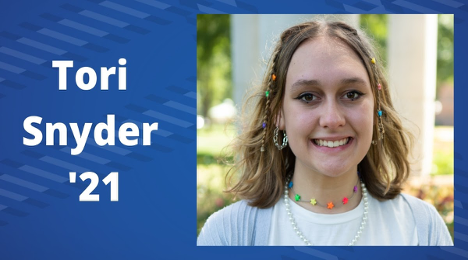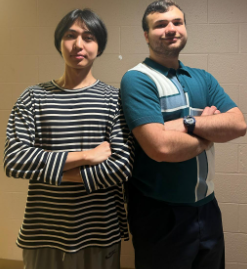PC Student Tori Snyder Receives NASA Research Award

With help from Dr. James Wanliss, Tori Snyder received an award from the National Aeronautics and Space Administration (NASA) for her research.
September 25, 2020
Whether it’s a competition or capstone, doing research about a major topic is a lot of work. From crediting to looking up sources, it’s a massive project that requires dedication.
One PC student is not only being recognized for her research at school, but is also being awarded by a massive organization.
PC Student Tori Snyder recently received a research award from the National Aeronautics and Space Administration (NASA) for her research project on Galactic Motion and Cosmic Rays. Synyder received the grant from NASA to conduct her research.
The NASA Space Grant, founded in 1989, helps students like Snyder across the country to participate in NASA research projects and provide them with more educational opportunities. With these grants, NASA uses a peer review to help select research projects that aim at achieving NASA’s main goal, which is to expand human interaction in the solar system and to bring back new knowledge to Earth.
Interestingly, Snyder did not start out as a Physics major, and it wasn’t until her second semester of freshman year that she realized her passion for Physics.
“I got into physics a little late; I was already in the second semester of my freshman year when I decided I wanted to major in it. I had always had an interest in physics, math, astronomy, things of that nature, but when I took PHYS 1000 with Dr. Owens as my science gen ed I found myself consumed with physics. I was watching every youtube video, reading every article, just trying to figure out all I could about the subject, and it made me so happy! I felt like I had finally found what I really, really loved, and I still love it to this day,” Snyder said.
Because of Snyder’s new love for Physics, she wanted to do research with the help of Dr. James Wanliss. After Wanliss proposed a unique research opportunity, Snyder was eager to begin conducting research on Galactic Motion and Cosmic Rays.
“I had already been talking with Dr. Wanliss about possible research. When he posed the idea of Galactic Motion and Cosmic Rays, I was really excited about it,” Snyder said.
During her research, Snyder said that the biggest challenge she faced was the uncertainty that surrounds research. The flexibility and unpredictability of conducting research is very different from the structured classroom setting.
“When it came time to do the research, the thing that surprised me the most was the uncertainty. I’m used to a set syllabus, three tests, weekly problem sets and labs. That’s the format we live our lives by in college. When you’re doing research, it’s more about finding a new idea and working with it until you can convince yourself you’ve exhausted that idea” Snyder said.
The good news for Snyder was that her hard work paid off. After exhaustingly long hours of research, she received the award from NASA and she couldn’t have been more excited about it!
“I was really excited! I had wanted so badly to try research as an undergrad because it’s important for grad school applications, and I needed to know for myself how I felt about research because I had heard horror stories. So I saw this as an opportunity to answer questions for myself and get experience under my belt,” Snyder said.
Following her research experience, Snyder gave advice for any student at PC wanting to do undergraduate research.
“I have two pieces of advice: One, put yourself out there. You have to let people know you’re interested in research; it’s not going to fall in your lap most of the time” Snyder said. “Two, when it comes time to apply, make sure you show them you’re enthusiastic! Make use of your personal statement. Tell them how much you really want to do research and about your passion for your subject.”
After graduating from PC, Snyder hopes to get her Ph.D and become a Physics professor so that she can share her love of Physics with future students just like herself.
“As for the future, I’d really love to be able to get a Ph.D, but I’d be just as happy being a teacher so I can show the younger generation how fun physics is!”





